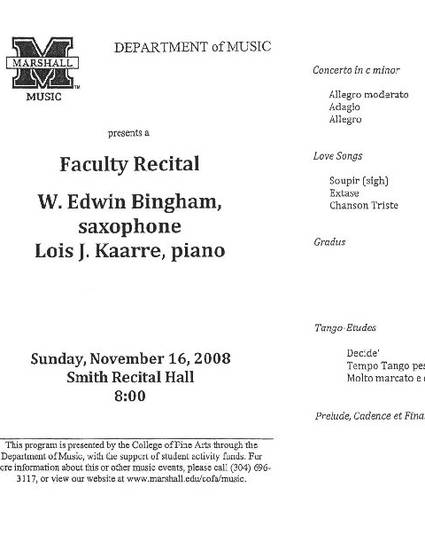
W. Edwin Bingham, saxophone
Lois J. Kaarre, piano
Program Notes
Benedetto Marcello was the son of a Venetian nobleman who followed the career path of all Venetian nobles of his time: he was admitted to the Maggior Consiglio of the Republic on 4 December 1706 and, after completing studies in literature and law, served in various magistracies over the next two decades. The last decade of his life is riddled with mysteries: he married the commoner Rosanna Scalfi, his singing pupil, in May 1728; had a religious experience in August of the same year; was exiled to the Istrian city of Pula (then part of the Venetian Republic) for three years (1730-33) as provincial governor; was absent from civic records for the next five years; and received his final appointment in Brescia as chief financial officer.
It is not easy to segment the musical continuum of Marcello's life, since he held no regular appointments of a musical nature and the majority of his musical works are undated. This demonstrates how severely separated in social experience dilettante composers were from the common ranks of musical maestri.
Marcello's role in formulating the values of classicism and promoting their musical implementation was his most significant contribution to cultural history. His influence was enormously, if subtly, pervasive. (New Grove Dictionary of Music and Musicians)
French composer Henri Duparc studied the Jesuit College of Vaugirard in Paris where he had César Franck as his piano teacher, and while studying law he found time for composition lessons from Franck, writing and in some cases publishing a number of works which he later destroyed. Of five melodies for voice and piano, published in 1868, he wished only Soupir and Chanson triste preserved; but Sérénade, Romance de Mignon and Le galop were later reclaimed and, though not forming part of the strict canon of the composer's works, provide interesting evidence of the influences of Gounod, Liszt and Wagner.
Soupir
Ne jamais la voir ni l'entendre,
Ne jamais tout haut la nommer,
Mais, fidèle, toujours l'attendre,
Toujours l'aimer!
Ouvrir les bras, et, las d'attendre,
Sur la néant les refermer!
Mais encor, toujours les lui tender
Toujours l'aimer.
Ah! ne pouvoir que les lui tendre
Et dans les pleurs se consumer,
Mais ces pleurs toujours les répandre,
Toujours l'aimer ...
Ne jamais la voir ni l'entendre,
Ne jamais tout haut la nommer,
Mais d'un amour toujours plus tender
Toujours !'aimer. Toujours!
Never to see or hear her,
never to name her aloud,
but faithfully always to wait for her
and love her.
To open my arms and, tired of waiting,
to close them on nothing,
but still always to stretch them out to her
and to love her.
To only be able to stretch them out to her,
and then to be consumed in tears,
but always to shed these tears,
always to love her.
Never to see or hear her,
never to name her aloud, but with a
love that grows ever more tender,
always to love her. Always!
Extase
Sur [ton sein] 1 pale mon coeur dort
D'un sommeil doux comme Ia mort
Mort exquise, mort parfumée
[Au]2 scuffle de la bien aimée
Sur ton sein pâle mon coeur dort
[D'un sommeil doux comme la mort]3
On your pale breast my heart is sleeping
A sleep as sweet as death
Exquisite death, death perfumed
By the breath of the beloved
On your pale breast my heart is sleeping
A sleep as sweet as death
Chanson Triste
Dans ton coeur dort un clair de lune,
Un doux clair de lune d'éte,
Et pour fuir la vie importune,
Je me noierai dans ta clarté.
J'oublierai les douleurs passées,
Mon amour, quand tu berceras
Mon triste coeur et mes pensés
Dans le calme aimant de tes bras.
Tu prendras ma tête malade,
Oh! quelquefois, sur tes genoux,
Et lui diras une ballade
Qui semblera parler de nous;
Et dans tes yeux pleins de tristesse,
Dans tes yeux alors je boirai
Tant de baisers et de tendresse[s]
Que peut-être je guérirai.
Moonlight slumbers in your heart,
A gentle summer moonlight,
And to escape the cares of life
I shall drown myself in your light.
I shall forget past sorrows,
My sweet, when you cradle
My sad heart and my thoughts
In the loving calm of your arms.
You will rest my poor head,
Ah! sometimes on your lap,
And recite to it a ballad
That will seem to speak of us;
And from your eyes full of sorrow,
From your eyes I shall then drink
So many kisses and so much love
That perhaps I shall be healed.
Gradus (1976) is for solo soprano saxophone and is one of the first pieces Philip Glass composed upon his return to New York from his studies with Nadia Boulanger in Paris and work with Ravi Shankar. Structurally, Gradus deals with the juxtaposition of melodic and rhythmic material within repeated cycles of 32 beats, and although it is highly structured on the one hand, it also sounds highly intuitive and unpredictable on the other. (Jon Gison)
Argentine composer and bandoneon player Astor Piazzolla , after years of writing and playing in Buenos Aires bars was determined to break into 'serious' music by taking composition lessons from Nadia Boulanger in Paris. She directed him back to Argentina's true national music-tango-which he transformed by incorporating rhythms and harmonic dissonances derived from jazz and orchestral music. His later work, notably with the Quinteto Tango Nuevo after 1976, was controversial, offending many tango populists by its sophisticated radicalism. The Tango-Etudes were adapted and harmonized by the composer for a variety of different instruments. (Oxford Companion to Music)
Alfred Desenclos' Prelude, Candence et Finale was commissioned by the Paris Conservatory for the school's 1956 year-end saxophone concours. The composer viewed this work as a "suite" in three connected movements. This serious well-written triptych showcases the expressive and virtuosic possibilities of the classical saxophone.
- concerts,
- recitals,
- saxophone,
- arrangements,
- concerto
Available at: http://works.bepress.com/ed_bingham/23/

Marcello, Alessandro, 1669-1747. Concertos, oboe, string orchestra, D minor; arranged
Glass, Philip. Gradus
Piazzolla, Astor. Études tanguistiques
Désenclos, Alfred, 1912-1971. Prélude, cadence et finale, saxophone, piano